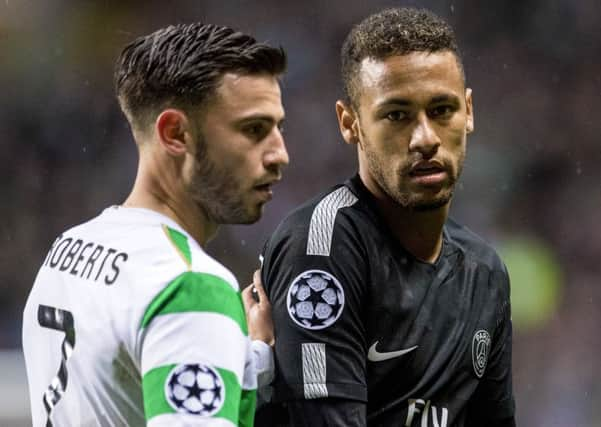Allan Massie: Celtic loss brings warning for Scottish rugby


Well, this is doubtless a good thing. Neither coach is a Scot, though Rennie has the obligatory Scottish Granny, but their response to victory was Scottish in an old-fashioned way. It reminded me of the Aberdeenshire farmer whose daughter presented him with her honeymoon snaps. He studied them in silence, then put his finger on one and said “thon’s the worst”.
Still these are days of promise for Scottish rugby. But for how long? We’ve been reminded this year that 50 years ago Jock Stein’s Celtic won the European Cup. This week in their first match in the Champions League Celtic lost 5-0 at home to Paris Saint-Germain, and nobody was greatly surprised. Celtic’s Lisbon Lions were all born almost within shouting distance of Celtic Park; PSG’s players come from all parts of the globe. They are a French team in that the club is in Paris and they have French fans, but, in the post-Brexit language they are “Anywheres”, not “Somewheres”. Celtic have their fair number of “Anywheres” too, but not as good ones. They’re by far the best team in Scotland, but earlier in the week their manager Brendan Rodgers said Stein’s triumph would never be repeated – and nobody said “awa’ an’ bile yer heid”.
Advertisement
Hide AdAdvertisement
Hide Ad1967: how was Rugby Union then? Well, it was of course an amateur game, and would remain that for almost 30 years. Almost all club matches were “friendlies”. There was the Border League, but no national league; none in England, Wales or Ireland either. England had a county-championship, Ireland had their inter- Provincial, we had a District championship, but English counties, Irish Provinces and Scottish districts weren’t clubs. Wales had no formal competition, but they did have fiercely competitive clubs.
International nets were spread widely, players being picked from a diversity of clubs, some of them small ones. The Scotland team against France in the first match of the 1967 championship had one player – the great David Rollo – from Howe of Fife and another, Alasdair Boyle, from St Thomas’s Hospital in London. The French XV was drawn from ten clubs, some of which – Angouleme, Dax, Mont-de-Marsan, Lourdes, Tulle – no longer feature on international team-sheets. Big money has concentrated talent in big clubs in France, as it has in England. In that 1967 season the English Calcutta Cup team included players from Bedford, Moseley, Coventry, Bradford, Nottingham and Richmond.
Fifty years on money and the trans-national movement of players have changed rugby vastly, just as money and trans-nationalism have changed football, even if not yet to the same degree – partly because in comparison with top-level football there is much less money, partly because the IRB exercises more control over its game than Fifa over football so that in the Northern Hemisphere the International championship still matters more than club competitions. Yet one wonders for how much longer this will be the case. It is after all clear that in France and England the rich men who own clubs don’t always care much about the French and English national team. Toulon, for instance, won the Heineken Cup with scarcely a Frenchman in their starting XV – just like PSG. The big football clubs like Barcelona and Real Madrid, Chelsea and the two Manchester clubs are national only in the sense they are based in Spain or England and have Spanish and English fans. Now in football all new money tends to come in vast sums from Asia and the Arab Gulf States, and it is Qatari money which had enabled PSG to buy the brilliant Brazilian Neymar, left, for a price equivalent to I don’t know what – a couple of new hospitals? Or more? A new bridge over an estuary? One loses count of the noughts.
What will happen to rugby if this sort of money comes to swamp the game? – and the likelihood is that it will, given the sport’s growing global popularity. What happens to rugby in a small country like Scotland? The fear must be that Scottish rugby will in time, and not so long a time perhaps, suffer the same fate as Scottish football, the fate which had Rodgers saying that Celtic, unrivalled here in Scotland, will never win another European Cup, never, I would guess, come within a whisker of doing so.
Money talks very loudly. It talks everywhere, and I would be inclined to wager, sadly, that in 20 years or so even New Zealand will not be able to maintain its present rugby structure and retain control of its best players. If I don’t place the bet, it’s because I shan’t be around to collect my winnings. And as for Scotland, well, the best we can hope for is that we cling to our present status for a bit longer. But “cling” is the right word.